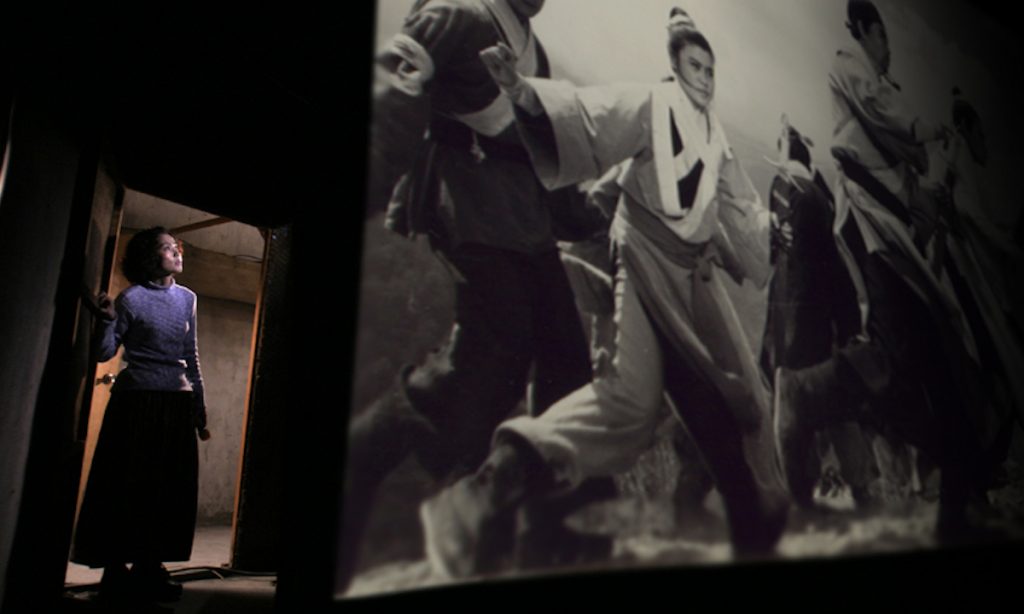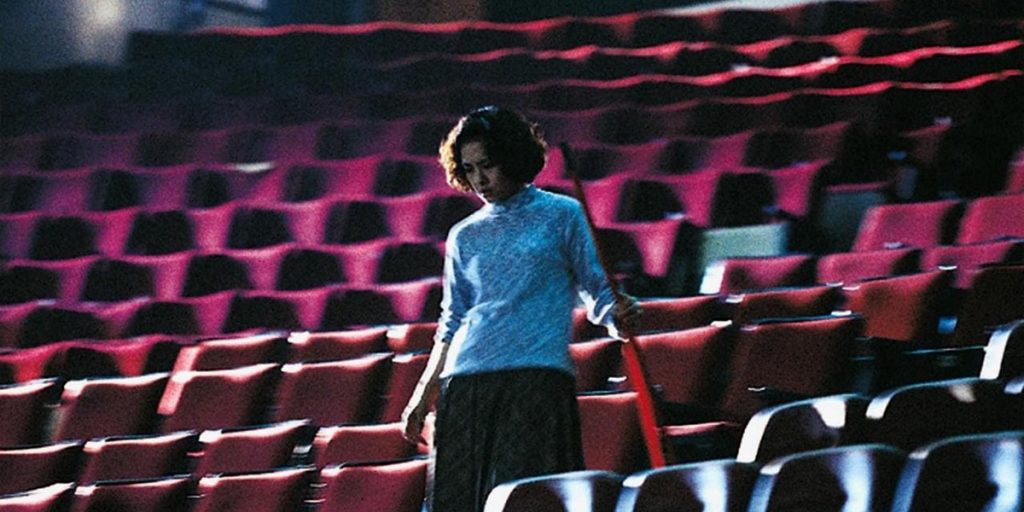Goodbye, Dragon Inn is a meditative, impactful farewell to a cinema in Taipei and exerts even more resonance when looked at through the lens of the past year.
When COVID-19 first took hold of the world in early 2020, life changed drastically. Schools and workplaces closed, people were told to stay at home, contact tracing and testing began on an enormous scale, and all non-essential businesses were shuttered indefinitely. As film production around the world halted, cinemas closed (some temporarily, others tragically permanently), their projectors grinding to a halt and their popcorn machines spitting out no more kernels. The shared experience of watching a film in the cinema would not return for several months in most countries, and even then, only intermittently sandwiched in between lockdowns. Goodbye, Dragon Inn has no such pandemic in its story, but still has the same frightening emotions of closure and farewells that many around the world have felt in the past year. As the rain lashes down outside at night, a final film (1967’s classic, Dragon Inn) plays at a regal cinema in Taipei. Tsai Ming-liang captures this final showing with an air of slow-burning, hypnotic magic. Goodbye, Dragon Inn is a glorious ode to cinema and a film that bears even more relevance for audiences today.
As one of the leading members of the Taiwanese New Wave, Tsai’s influence on the country’s film industry cannot be underestimated. His methodical, delicate directorial style is at odds with the action films of the previous decades in Taiwan, and his playful nature – often hidden amongst the measured pacing – sets him apart from other directors of this movement. In Goodbye, Dragon Inn, Tsai is still mindful to respect those earlier action films; Dragon Inn, showing at the cinema, is a fast-paced, sword-fighting epic, and Tsai shows plenty of footage of it as it plays on the big screen as well as focussing on audience members connecting with and enjoying the images. Lasting just under 90 minutes, Goodbye, Dragon Inn follows a select group of people on this final night at the cinema: the ticket woman (Chen Shiang-chyi) searching for the projectionist (Lee Kang-sheng), a Japanese tourist (Mitamura Kiyonobu) more interested in finding a man for a sexual encounter than the film itself. People such as Jun Shih and Miao Tien – two men who starred in the original Dragon Inn – also sit in the audience. The small stories and interactions that come from these characters are wonderful, sometimes touching, sometimes funny, but always mesmerising.

Goodbye, Dragon Inn is typical of Tsai’s style; there is barely any dialogue, almost no camera movement, and a plethora of long shots, each one usually lasting for more than 30 seconds at least. This might frustrate some – and it would be untrue to say moments don’t test the audience and their concentration – but stick with Goodbye, Dragon Inn and you will be richly rewarded. A scene from around the halfway mark of the film captures the ticket woman clearing up the now empty auditorium, a vast space now completely silent after the credits for Dragon Inn have rolled. She picks up a few bits of litter and leaves; on the surface, perhaps nothing more than an unnecessarily drawn-out scene of the mundane. But look closer and the complexity of the image unravels.
The static camera ensures the audience members remain respectful observers, treating them to the glorious view of the large auditorium. Moments earlier, Dragon Inn plays on the screen, and now in the silence Tsai ensures the fact that this is the last film the cinema will show remains powerful and impactful. He captures one vast room which holds a deep, historical charge and shows that a closure like this is a moment that will affect not just audience members but the employees, like the ticket woman, too in their everyday lives.
Goodbye, Dragon Inn does not do anything grandiose to force these emotions into your face. Everything about this film is subtle, from the sound design capturing the atmospheric noises of the building to the stripped-back script which results in the events being told visually rather than aurally. Some of the best moments of Goodbye, Dragon Inn involve no dialogue. One of a few moments of humour sees the Japanese tourist entranced by the film on screen but completely distracted by a couple noisily eating behind him. It is a moment that anyone watching Goodbye, Dragon Inn can relate to, an annoyance that you might not have missed for the past year but one that actually, bizarrely, makes you feel comforted. It is one of many delicately observed moments of life put forth by Tsai with such realism and grace that you’d be forgiven for thinking you were there in that very moment.
As the world starts to awaken again, albeit slowly, places like cinemas are reopening. Some will, sadly, never open again, but the countless experiences that people have shared within each building will never be forgotten. History is vast and cinemas around the world are part of that collective, and always will be. Tsai’s beautiful, melancholic Goodbye, Dragon Inn is a testament to this. Do not be threatened by the slow pacing and, instead, be welcomed by the nostalgia and wonder that the film harbours. It will simmer with a haunting power as you watch it and so too for weeks and months afterwards.
Goodbye, Dragon Inn has been recently restored in 4K, and is being screened in cinemas in the UK.

